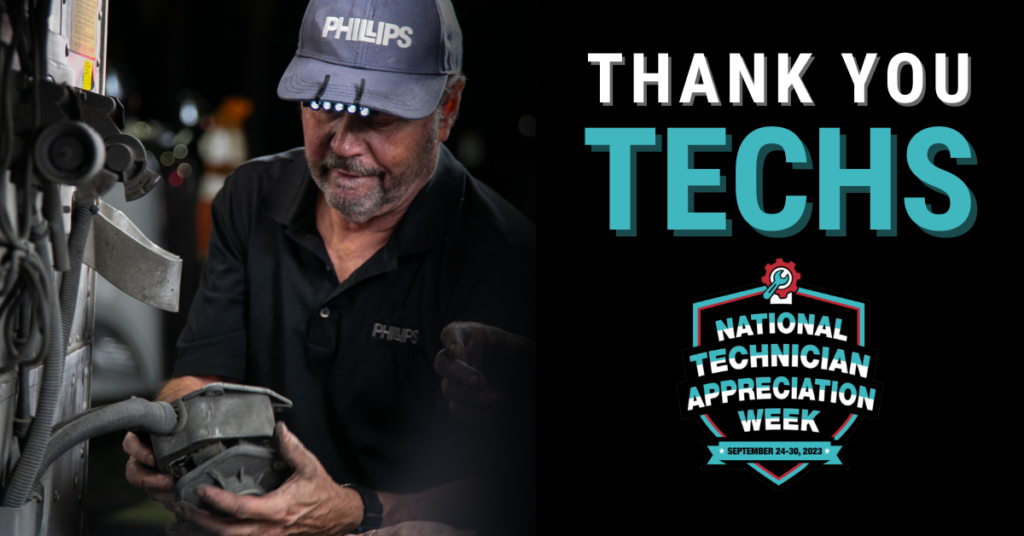
In honor of Technician Appreciation week, we are bringing you some helpful tips from our very own experts! Harsh weather can wreak havoc on electrical equipment. Here are some insightful tips to help you prepare for the upcoming changing weather conditions and prevent damage that corrosion can cause.
Corrosion is a chemical reaction between metal and its surrounding environment which results in a gradual deterioration over time and is more prevalent during the winter months. The environmental conditions and the contaminants the metal is exposed to determine the rate of deterioration. One of the most vulnerable areas to corrosion is the electrical system and is typically where a fleet or driver will begin to notice problems with corrosion first. This is because electricity causes the copper wiring with in the electrical system to heat up and expand. As it expands and contracts with the fluctuating temperature it ads as a sponge, sucking moisture and contaminants further in, accelerating the corrosion process.
In a simple experiment conducted at Phillips, it took less than 24 hours for saltwater to “wick” its way through a 7-inch piece of copper wire, WITHOUT varying temperatures that would expand and contract the wiring. Imagine how much farther it could have traveled if an eledrical current was passed through the wire? Additionally, this experiment was conducted with salt and water. Today, the roads are paved with de-icing chemicals such as magnesium chloride and calcium chloride. These chemicals are 50% smaller than sodium chloride (salt) fitting into tighter spaces. They are highly soluble in water creating finer mists of spray that coat more of the vehicle and are hygroscopic with the ability to absorb moisture from any source, including the air in low humidity conditions, meaning corrosion can continue to spread well into the warmer months.
Preventative Maintenance
Everything in fleet maintenance starts and ends with the proper equipment specifications for a vehicle’s operational environment and use. Failing to specify equipment properly, will fail to meet one’s needs, resulting in unnecessary maintenance and repairs down the line. Vehicles that are exposed to harsh weather and de-icing chemicals should be spec’d with premium sealed electrical harnesses and non-corrosive components such as non-metallic noseboxes, and nylon plugs and sockets. Metal plugs and sockets seem to be more popular than nylon due to the misconception that metal is more durable. However, metal and non-corrosive nylon both have tensile strengths that far exceed what is needed to withstand the wear and tear encountered on the road, BUT the anti-corrosive properties of nylon will outlast metal in the long run as the metal housing begins to break down due to corrosion.
The next important item is a preventative maintenance program. Maintaining a vehicle’s electrical system all year long means less worry as the winter months approach, making sure it’s ready for the wet weather. The additional steps below, if not already incorporated into a preventative maintenance program, can help prevent damage that corrosion can cause.
Steps
- Significantly reduce magnesium and calcium chloride build-up during cold weather by frequently washing equipment. Do not power wash as water can be forced into areas and cannot escape, leading to corrosion.
- When degreasers come into contact with electrical connections, it increases the corrosion reaction. Do not leave soap residue on electrical connections.
- Every 6 months, or more frequently in highly corrosive environments, use a plug and socket brush with water (NOT SOAP) to clean connectors.
- After every cleaning, re-apply dielectric grease on plug and socket pins to keep corrosion at bay.
- Inspect cables and wires for road hazard damage such as cracks, cuts, rubbing or excessive butt connectors from an old repair. Wiring can wick moisture and additional corrosion might be present further up from the initial problem area. Replace or repair any damaged areas.
- If you must repair wiring harnesses, or any kind of wiring, use heat shrink terminals and/or heat shrink tubing with adhesive that seals the connection.
- Check battery jumper cables and connections for signs of corrosion.
- Protect battery posts and terminals with anti-corrosive spray.
TIPS
- Corrosion is a chemical reaction between metal and its surrounding environment which results in a gradual deterioration over time and is more prevalent during the winter months.
- Failing to specify proper equipment for a vehicle’s operational environment and use will fail to meet one’s needs, resulting in unnecessary maintenance and repairs down the line.
- Maintaining a routine preventative maintenance program all year long means less worry as the winter months approach, making sure a vehicle’s electrical system is ready for the wet weather.

